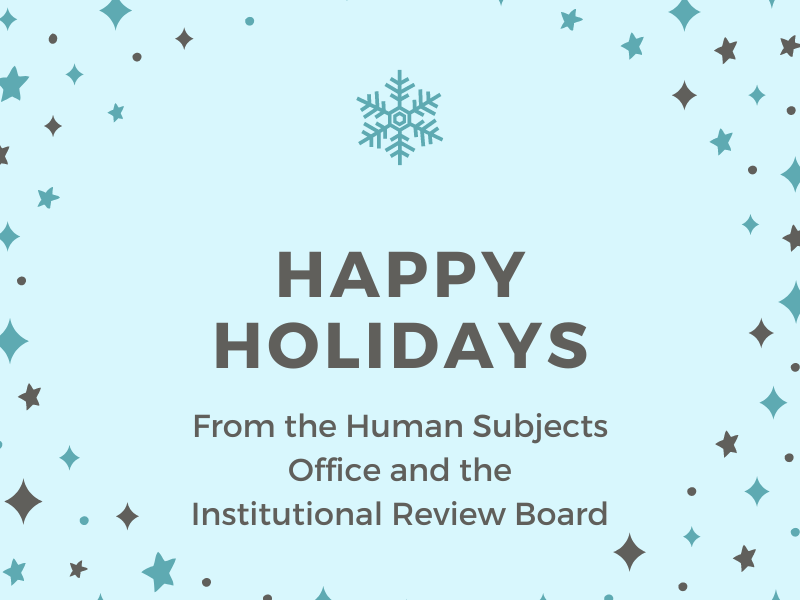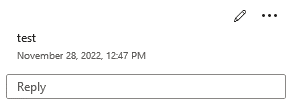Breadcrumb
- Home
- Get Help
- Newsletters
- December 2022 IRB Connection Newsletter
December 2022 IRB Connection Newsletter
Holiday Wishes
Hot Topics and Updates from the IRB and Human Research Protection Program
Herky Hint: How to get Clean, IRB-approved Documents
Medical Ethics Advisor Newsletter, November 2022
In the News
Holiday Wishes
Wishing you and yours health and happiness this holiday season! We look forward to working with you in 2023!

Hot Topics and Updates from the IRB and Human Research Protection Program
By Kelly O’Berry, BS, CIP

On October 19, 2022, the Human Subjects Office (HSO) gave the triannual lecture about hot topics and updates for human subjects research and the Human Research Protection Program (HRPP). Below are highlights from this lecture. For additional information, view the recording in the IRB ICON Course for Researchers (under Additional Topics).
IRB Metrics Platform Demo
The UI research community can access UI IRB metrics in the left-hand menu bar on the HSO website. This page provides links to more information:
- Total number of forms reviewed per year (around 10,000)
- Total number of active protocols (usually around 4,400)
- IRB review process flow chart – This is color coded by role (PI, HSO, IRB or IRB Chair and Other Committees).
- Other Committee Review Information – See the Other Committee Tool, Human Research Protection Program Flow Chart and links to information about each committee or entity
The Human Research Protection Program/IRB Metrics capture mean approval times. The clock starts when the form is accepted for review during the prescreening process.
Sign in with your HawkID, then click the gold box and “Sign-In” to view the report platform. Viewers can sort data by:
- Quarter of the year
- IRB (IRB-01 Biomedical, IRB-02 Social/Behavioral and IRB-03 VA)
- Form Type (New Project, Modification, Modification/Continuing Review, Continuing Review Only, Reportable Event Form, Human Subjects Determination Form and several other forms)
- Review Type (full board, expedited, exempt)
Primary Reviewer Questions Before an IRB Meeting
The UI IRB assigns a Primary Reviewer to all forms on the IRB meeting agenda. The Primary Reviewer presents the study at the meeting and makes recommendations based on regulatory criteria for IRB approval (45 CFR 46.111). Other IRB members participate in the discussion and raise issues or questions.
During the Hot Topics presentation we shared a pre-meeting timeline that explains why the Primary Reviewer may contact the PI within a few days of the IRB meeting:
| Event | Timeframe |
| Form scheduled to meeting | 7-15 working days before meeting |
| Notification of IRB meeting date to PI, HawkIRB Delegates and Contact Persons | Immediately after scheduling |
| IRB meeting agenda finalized | 7-10 working days prior to meeting |
| IRB meeting agenda distributed to attendees | 5-7 working days prior to meeting |
| Primary Reviewer may contact the PI with questions | Prior to meeting – ideally as far in advance as possible |
| PI response to questions | Prior to meeting |
All members have seven days to review materials for all agenda items prior to the meeting. We encourage Primary Reviewers to conduct their reviews as soon as possible to give the PI time to respond prior to the meeting.
IRB Meeting Schedule
- IRB-01 meets Thursdays and every other Monday
- IRB-02 meets the 4th Wednesday
- IRB-03 typically meetings the 3rd Monday
Why the Primary Reviewer May Contact the PI
Primary reviewers contact the PI to ask questions about the research application. They may have identified missing or inconsistent information about the study. Or they may have a concern about whether the project meets the regulatory requirements for IRB approval.
The information the Primary Reviewer collects from the PI or research team member may allow the IRB to review and incorporate the information rather than having to table it. When an agenda item is tabled, it must return for discussion at a future IRB meeting.
There is a regulatory requirement to maintain a record of all communications between the IRB and the researchers. When a Primary Reviewer contacts the PI by email, they typically cc the IRB meeting Chair, the Full Board Group (irb-fullboard@uiowa.edu), Contact persons on the team and HawkIRB Delegates for that project.
Submit Continuing/Biennial Reviews on Time!
The HawkIRB system sends automated notices when a project is due for Continuing Review or Biennial Review:
- 60 days – Researchers are encouraged to start preparing the Continuing Review (CR) or Biennial Review (BR) form right away when you receive this first notice.
- 30 days – The CR/BR form submission deadline is usually about 1 month before IRB approval lapses.
- 14 days – The CR/BR form is late, but is still required to ensure compliance
- 7 days – Time is running out for submitting the CR/BR form and obtaining IRB approval prior to lapse of IRB approval
- 1 day – Submission of a CR/BR form at this point almost always means that IRB approval will lapse. But it is still required to ensure compliance.
IRB approval lapses at one minute after midnight on the expiration date. At that time, HawkIRB sends a final lapse notice stating that all research activity must stop.
The Human Subjects Office will administratively close all projects that have not submitted a Continuing Review or Biennial Review form generally within 24-48 hours after the final lapse notice. Research that has lapsed IRB approval is no longer in compliance with the regulations and/or University of Iowa IRB policy.
Deactivated Principal Investigators
Faculty, staff, trainee and student researchers must have an active HawkID to access to the HawkIRB system. When they leave the UI and no longer have an appointment or affiliation with the institution, they are considered “deactivated.” A HawkIRB Delegate has limited access after the Principal Investigator leaves the UI. They can:
- Submit a Modification form to change the PI
- Submit a Project Close form
- Respond to Workflow for either of these types of forms
But this is only possible if the PI named a HawkIRB Delegate prior to leaving the UI. The HSO/IRB strongly encourages PIs to pull documents they need from the HawkIRB system and either close all projects or change the PI for projects that will continue after their departure.
The Human Subjects Office periodically runs a report of deactivated PIs. We send an email to the PI, Contact Persons on the research team and the Department Executive Officer (DEO) with a request to either close the project or submit a modification to name a new PI. If there is no response within one week, HSO staff administratively close the project. Once closed, all research activity must stop. There is no option to reopen an application once it is closed. If there is ongoing research activity for a project that was administratively closed, the new PI will need to submit a New Project form to obtain IRB approval before the research can continue.
Future IRB Hot Topics Lectures
The HSO will offer the next Hot Topics lecture on March 22, 2023. We hope you can join us or view the recording in the IRB ICON Course for Researchers.
Herky Hint: How to get Clean, IRB-approved Documents
By Rachel Kinker, MPA
After a new document is attached to the HawkIRB application, there can be changes and edits during the IRB review process. However, the final document should be clean and ready to present to a subject. This article describes the most common issues with attachments and how to address them.
- Document approved with bold/bracketed instructions – Human Subjects Office Review Staff add instructions in documents to explain where edits may be necessary. Researchers should delete these instructions after addressing them. When these instructions are in an IRB-approved document, email irb@uiowa.edu and HSO staff will issue a correction.
- Document approved with comments – Sometimes comments are added by a sponsor or Contract Research Organization. Or they might be added by the UI research team. Comments can cause spacing errors and bad page breaks. They also require an extra step for Human Subjects Office staff to remove when the form is approved. It is best to remove all comments prior to submission unless the comment specifically explains why the document contains language that is not part of the IRB Informed Consent Document Template.
When comments are in IRB-approved documents, submit a Modification form and use the Edit function to remove them. To remove a comment, select the three dots in the top right-hand corner of the comment box and select ‘delete.’ To delete all the comments in a document, under the ‘Comments’ section of the ‘Review’ tab, under ‘Delete’, select ‘Delete all Comments in Document’.

- Document approved with bad page breaks – Submit a Modification form and use the Edit function to correct the formatting. Under ‘Review’ and ‘tracking’ change the display to ‘no markup’ and proofread the document prior to submitting to prevent formatting and punctuation errors.

- Problem with IRB approval stamp – The stamp will not populate properly if a researcher edits the formatting codes. If the IRB Stamp has been altered, it will need to be resubmitted with the appropriate templated content. Contact irb@uiowa.edu for assistance in correcting prior versions. Generate a blank stamped document. Use the Edit function and copy the stamp placeholder from the blank stamped document into the edited version of the document with the stamp error. Submit a Modification form to the IRB for approval.
- Document approved with tracked changes – Send an email to irb@uiowa.edu. Provide the IRB number and the document that contains tracked changes. A HawkIRB Administrator will make the correction.

Medical Ethics Advisor Newsletter, November 2022
By Rachel Kinker, MPA

Medical Ethics Advisor (a publication of Relias, LLC) is a monthly newsletter with articles about human subjects research and medical ethics. Current and past issues of Medical Ethics Advisor and IRB Advisor are posted in the “IRB ICON Course for Researchers.” The portal to this ICON Course is on the Education and Training page of the Human Subjects Office website. This month we are spotlighting some articles about human subjects research from the November 2022 Medical Ethics Advisor Newsletter.
Researchers Are Revamping Processes to Gather Community Input
There is increased awareness of the importance of researchers engaging with the community when developing and planning clinical trials, some researchers are creating community advisory boards. Some benefits to utilizing community advisory boards include,
- Ensuring that the proposed research does not go against the values of the communities
- Adding creditability to the research
- Increased participation
- Patient and community centric development of clinical trials
- Increased recruitment and retention of underrepresented populations in clinical trials and informed strategies and plans
- Assistance in developing an appropriate study design
- Strengthen trust in research and foster civic engagement in clinical trials
- Providing participants with regular updates on the results of the research
- Assistance with translating consent forms proactively
- Assistance with navigating cultural nuances
- Developing a budget to accommodate the needs of participants including transportation
There are often existing resources for researchers to engage as well, such as existing local patient or community advisory boards, and belonging committees, business or employee resource groups and local organizations.
Important questions to consider when developing a project,
- Why is this important to this population?
- How will assisting the researchers’ project affect the participants daily lives?
- Is there compensation for the participants time and effort?
- Why this community/population and not another?
- Is this aligned with the priorities of the population of interest, or am I, the researcher, simply conducting research for my own benefit?
Informed Consent Requirements May Hinder Innovation in Stroke Treatments
Acute stroke is a common condition, however, there have not been many advances in treatment options since the 1990s. The current structural barriers of conducting a study on patients with an emergency condition could be preventing innovation where newer and perhaps more effective drugs could be designed. Studies can be designed to ethically answer questions and allow for innovation by considering the following,
- Considering the impact on all future stroke patients, as well as the individual study participant
- Evaluating and determining the necessity of required elements of informed consent, such as follow-up procedures, information on privacy protections and other items that are not unique to the study
- Some research would not be possible if prospective consent from the participant was required
- While researchers are obligated to protect people that are vulnerable, incapacitated, or unable to make an informed decision, they are also obligated to prevent inequities that would arise if the same people could never be involved in research
- Developing plans to seek consent for continued participation in the research when the previously incapacitated person regains capacity, or a surrogate decision maker is found
Articles in the November 2022 Issue:
- Artificial Intelligence Soon Could Transform the Field of Clinical Ethics
- Researchers Overlook Unintended Consequences of Health Technology
- Shared Decision-Making Is Ethical Balancing Act for Clinicians
- Decision-Making Capacity Is Concern for Older Study Participants
- ‘Informed Assent’ for CPR Is Reasonable Approach for Some Hospitalized Patients
- Adults with Developmental Disabilities at Risk for Poor End-of-Life Care
- Ethical Approaches to Address Nursing Workloads, Staffing Shortages
- IRBs Tend to Err on the Side of Protection, Not Inclusion

In the News, December 2022

- Scientists Debate the Role of a Virus in Multiple Sclerosis, Undark
- Early research suggests promising use of AI to predict risk of heart attack or stroke using a single chest X-ray, CNN
- Antimicrobial Resistance Is Growing because of COVID, Scientific American
- New Gene-Editing Tool Could Fix Genetic Defects-with Fewer Unwanted Effects, Scientific American
- New blood test can detect ‘toxic’ protein years before Alzheimer’s symptoms emerge, study shows, Science Daily